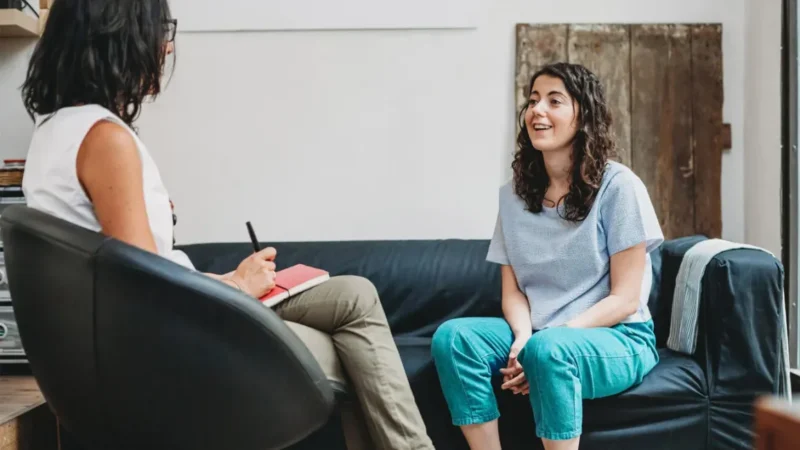Social Anxiety Disorder is a common mental health issue that has very high recovery rates. The most effective treatment is talk therapy. Therapy techniques like Cognitive Behavioral Therapy (CBT) and Exposure Therapy are the gold-standard treatments for social anxiety.
But in order to receive this treatment, you need to find a social anxiety therapist. Although you could just search for “therapist near me”, narrowing down a therapist that is good for you is a whole different issue. This article will give you some practical tips and things to look out for when trying to find a social anxiety therapist near you.
Why should I seek a social anxiety therapist near me?
Many people hesitate to seek therapy because they believe their struggles aren’t “bad enough.” There’s often a misconception that you must hit some invisible threshold of suffering before you deserve help.
That couldn’t be further from the truth. If you’re struggling in any way, no matter how mild or severe it feels, you deserve support. Everyone deserves to live a life that feels bright, free, and fulfilling.
Social anxiety can dim that light by making even everyday interactions feel overwhelming. A qualified social anxiety therapist can help you reclaim that sense of ease and confidence through personalized treatment and compassionate guidance.

Seeking a therapist near you offers additional benefits, such as consistent access to care, reduced travel stress, and a stronger connection to local support networks. Having someone nearby also makes it easier to maintain regular sessions, which is vital for steady progress.
Through working with a social anxiety therapist, you can:
- Reduce fear in social situations and feel more confident when interacting with others, whether it’s speaking up in a meeting or chatting with a friend.
- Improve daily functioning at school, work, or within relationships by developing effective coping mechanisms.
- Learn practical skills to manage anxiety symptoms and prevent panic attacks before they spiral.
- Challenge negative thought patterns that heighten self-consciousness or trigger avoidance behaviors.
- Build social skills and practice communication in a safe, supportive environment where mistakes are part of learning.
- Prevent isolation by feeling more comfortable engaging with others and participating in community life.
- Address co-occurring issues such as depression, substance use, or low self-esteem, which often accompany social anxiety.
Seeking therapy isn’t about being “broken” or needing to be “fixed.” It’s about giving yourself permission to live better, to show up to your life fully and confidently.
Finding the right social anxiety therapist near you is the next essential step.
Local therapists often understand the cultural and community context you live in, making their support even more relevant. Let’s take a closer look at how to find the best social anxiety therapist in your area.
What makes a good social anxiety therapist?

A good social anxiety therapist is someone who understands you, listens to you, knows what they’re doing, and with whom you feel comfortable.
Finding the right therapist can take time, but the connection you build will be the foundation of your progress.
Two key aspects define a good match: your comfort level and the therapist’s clinical orientation.
Your Comfort Level
Your comfort level is the number one factor when finding a good therapist, especially if you have social anxiety disorder. Social anxiety makes it difficult to even attend therapy sessions.
Just showing up in the therapist’s office is already a big victory, and you should feel proud for taking that step.
Being comfortable with your therapist helps reduce the anxiety that can come with opening up. When you feel safe and supported, you’re more likely to share openly, trust their process, and engage deeply in therapy. That sense of ease creates the foundation for meaningful progress.
When considering your comfort level, think about the following questions:
- Does it matter what gender your therapist is?
- Do you prefer someone with a similar cultural, religious, or personal background?
- Is age or experience level important to you?
- Would you feel more comfortable with a therapist who specializes in anxiety disorders specifically?
There is no universal right or wrong answer here, it’s all about what helps you feel most comfortable and supported in your healing process.
Clinical Orientation

Clinical orientation refers to the therapy method or framework your therapist uses. Every therapist is trained in one or more therapeutic approaches, each with its own strengths.
For example, Cognitive Behavioral Therapy (CBT) is one of the most common and effective options for social anxiety, but it’s not the only one.
Some therapists integrate multiple modalities to tailor treatment to each individual’s needs.
When searching for a good social anxiety therapist, look for someone who practices or combines the following approaches:
- Exposure therapy: Gradually and safely introduces you to feared social situations in a controlled way. Over time, this helps you face triggers, reduce avoidance behaviors, and build lasting confidence.
- Cognitive behavioral therapy (CBT): Focuses on identifying and challenging negative thought patterns that fuel anxiety. It helps you replace unhelpful beliefs with realistic, empowering thoughts and teaches coping skills for managing anxiety in daily life.
- Acceptance and commitment therapy (ACT): Encourages acceptance of anxious thoughts rather than fighting them, while committing to actions that align with your values.
- Psychodynamic therapy: Explores the roots of social anxiety through past experiences and relationships to foster deeper self-awareness and change.
A skilled therapist often blends several of these approaches, adjusting based on your progress and comfort level.
Practical Considerations
Once you’ve identified therapists who fit your comfort level and clinical needs, the final step is ensuring that practical factors align with your lifestyle.
Even the most qualified therapist may not be the right fit if logistical barriers make it hard to attend sessions consistently.
Therapy requires regularity and stability, and the easier it is to attend, the more likely you are to stay committed and make lasting progress.

Before committing to a therapist, take a moment to ask yourself the following questions:
Do their available hours work with your schedule?
Think about your work or school commitments, commute times, and personal responsibilities. Finding a therapist whose availability matches your routine can reduce stress and prevent skipped sessions. Some therapists also offer evening or weekend appointments for added convenience.
Are they available for in-person, online, or hybrid sessions?
Accessibility is key, especially for those with social anxiety. Online therapy can be a great starting point if face-to-face sessions feel overwhelming at first. Over time, you might transition to in-person meetings as your confidence grows. Hybrid models, where you alternate between online and in-office sessions, can offer the best of both worlds.
Do they offer flexible scheduling options if anxiety makes attending difficult some days?
Social anxiety can be unpredictable. On tough days, having a therapist who understands and accommodates occasional rescheduling can make a big difference. Some professionals also provide shorter check-in sessions or asynchronous communication (like secure messaging) to help maintain continuity.
How accessible is their office location?
A therapist’s proximity can impact consistency. Choosing someone near your home, school, or workplace can remove logistical obstacles that might otherwise discourage attendance.
What are the costs, and do they accept your insurance?
Financial considerations are important, too. Check if they’re in-network with your insurance provider, or if they offer sliding-scale fees based on income. Transparent communication about payment helps reduce financial anxiety later.

